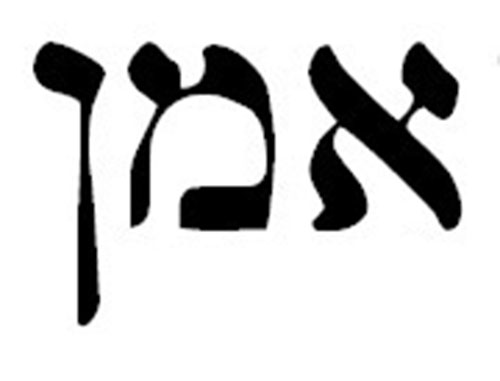
Some people appear to think that “A-women” is the feminine of “Amen”; some give the impression that “Amen” is gender exclusive and that saying, “Amen and A-women” is more inclusive.
They are wrong.
“Amen” occurs 30 times in the Hebrew Bible. It is not a noun – it is not a gendered word. In Hebrew, its root is a verb meaning to support, confirm, be faithful. So “Amen” affirms a statement.
“Amen” is used in Christianity and in Islam. In Greek, Latin, English, Arabic,… it continues to sound akin to the Hebrew and has no connection to the English word “men”. “Amen” is a loanword – a word borrowed from another language and incorporated into English.
Switching from “Amen” to “A-women” might be a bit of fun, wordplay, but cannot be treated with any seriousness. Following the logic, “A-women” still ends in the pesky three-lettered “men” just as “Amen” did. So, continuing the rationale, we would produce “A-wo-persons”. But, “persons” ends in the gendered “sons”. “Children” might be a non-gendered equivalent of “sons” but can also refer to any young people; so, “offspring” would be better. Amen and A-wo-per-offspring!!!
I was recently castigated for using the word “woman” and told I should use “womxn”. Might an alternative to “A-wo-per-offspring” it be “A-womxn”?! “Menopause” and “menstruate” would need to be high up on the need-to-change list. “Management” is doubly problematic having both “man” and “men” in it! And then there’s “mentor”, “menu”, “omen”… (check here); “manipulate”, “manufacture”… (check here).
Any who know me or have followed this site will know my strong advocacy of inclusiveness and of inclusive and expansive language. But we do ourselves no favour, and undermine our just promotion of this and make a mockery of our cause when we claim there is exclusivity where there clearly is none.



Writing as a priest and an academic working in Islamic Studies, I whole-heartedly agree. Tbh I haven’t come across A-women, but it is mad and shows a complete lack of understanding about words and their meaning.
On a more serious note, it shows the lack of knowledge, understanding and interest that people have in the Bible as a work of Hebrew, Aramaic and Greek. I’ve come across many Christians who were blissfully unaware that it was written in Hebrew! Perhaps the church needs to do much more to remind people of the origins of the Bible?!
Thanks, and agreed, Stephen! Surely there is no significant extra effort involved, when preaching or teaching, to say: “In the original, in the Hebrew…” I was spurred on to write this post by the prayer which opened Congress recently – that I link to in the post (click this link). Blessings.
It was done by a chaplain to the US Congress at the end of a prayer. Really dumb. I’m not aware of a trend or of this being done beyond that instance. It’s been widely ridiculed.
Thanks, Scott. Yes, that occasion is a link in my text. Blessings.
Thank goodness that some people have some sense and understanding. AMEN…SO BE IT!
I am embarrassed at the ignorance and absurb ideas of trying to delete any form of ‘MEN’
from our language. BOSCO, I think that your very well written comment should be published
in the newspapers!!
Thanks for your encouragement, Helen. Blessings.